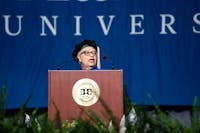In these troubling times, don't lose sight of those who helped keep Brandeis great
This spring, Brandeis had quite a semester. With the closing of the Rose Art Museum and many budget problems, it is hard to see anything truly positive in all that happened this year. However, beneath the surface, there have been good things to talk about. Selfless people have loyally aided Brandeis in this difficult semester. With so many negative stories in the press, it is easy to forget these great people. Their contributions are strong votes of confidence in uncertain times, something this University community desperately needs and should remember as it takes stock of this semester.On March 3, 2009, the Justice reported that an anonymous donor offered a donation to cover the operating fees for the Rose Art Museum. It was reported as a "substantial, low-six-figure gift" according to Joe Baerlein of Rasky Baerlein Strategic Commun-ications, Inc. Here was a much-overlooked nugget of good news as Brandeis continued to struggle over the undying Rose Art Museum issue from January.
More recent stories came from our own community. The golf team raised the $22,000 necessary to fund its continuation for another season from 80 donors. With donations at around $500 a pop, people rallied around the team to keep it afloat. Other universities have not been as lucky. The Massachusetts Institute of Technology cut eight varsity teams, golf included. Quinnipiac University also cut its golf program. Pepperdine University, the University at Northern Iowa, the University of Vermont and Western Washington University cut nongolf athletic teams. Whether these teams will weather the storm as Brandeis' golf team has is yet to be seen.
In the same issue as the golf team success story, the April 7 edition of the Justice reported that a $1 million gift had been given to the University for scholarships. Half of that amount will be given to current and future students in the humanities and fine arts. The other half will be added to the endowment. This good news was buried under the larger negative stories about the "resumption of hearing of grievances" with the Curriculum and Academic Restructuring Steering committee report, an influential editorial on need-based acceptance policies and continuing issues with the Rose controversy.
What has been most amazing about this year is the way that the community has come together. Prof. William Flesch (ENG) caught the Boston Globe's attention after he convinced one-third of the faculty to donate one percent of their salaries to save colleagues' jobs. He and his compatriots raised $120,000, enough to keep two or three jobs. That might not sound like much, but it's significant for those two or three employees.
The faculty worked with the administration to bridge the budget gap. These educators were never silent observers of the drastic CARS proposal or the struggles over the Rose. For example, on April 23 the faculty passed a resolution against recommendations to reorganize the African and Afro-American Studies department, the American Studies department and the Classical Studies department as interdepartmental programs. Although we as students do not know who voted in which direction, the Justice reported the following week that members of departments not directly affected by the proposal became involved. Members of the History and Sociology departments alike went on record critiquing the CARS proposal. Our professors are not parochial in their view of their responsibilities; their activity with the CARS proposal reflects commitment to the University as a whole beyond their respective departments.
Faculty members have been involved in the Rose controversy as well. On April 7, the Justice reported that 64 faculty gathered to protest the decision to close the Rose. Before that campaign, 22 faculty members co-signed a letter urging Provost Marty Krauss and the Committee on the Future of the Rose Art Museum to "recommend to the administration that, at a minimum, the Rose Art Museum should stay open as a public art museum, at its current level of professional staffing and continuing to mount high-quality exhibitions, until at least June 30, 2010." Brandeis professors believe in not just their careers but also Brandeis' commitment to the humanities and fine arts.
There has been a lot of bad news this year. The CARS committee report been has been met with wails from the departments it originally proposed to liquefy. Students have voiced concerns about how increasing the number of acceptances will affect the value of their degrees. Uncertainty can be found just by reading the "Op-Boxes" in most issues of the Justice this semester. It would be easy to write off this semester as a bad one for Brandeis. But it's clear that Brandeis loyalists are legion. We cannot close this semester without noticing the acts of Brandeis' friends. They make the story of this semester, with all its troubling stories, truly complete.



Please note All comments are eligible for publication in The Justice.